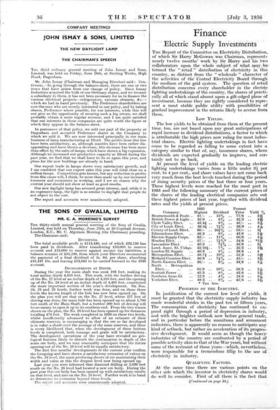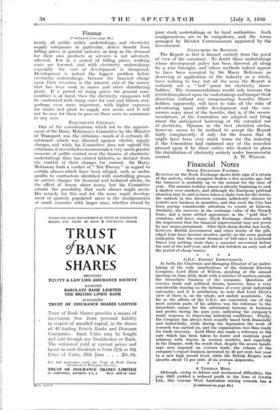- Electric Supply Itiiestmints
Finance
THE Report of the Committee on Electricity Distribtition, of which Sir Harry McGowan was Chairman, represents nearly twelve months' work by Sir Harry and his two collaborators upon. the whole subject of what may, .bq' termed the " retail " distribution of electricity in this country, as distinct from the " wholesale " character of the activities of the Central Electricity Board through the medium of the grid system. The question of retail distribution concerns every shareholder in the electric lighting undertakings of the country, the shares of practi- cally all of which stand. almost upon a gilt-edged plane of investment, because they are rightly considered to repre- sent a most stable public utility with possibilities of gradual improvement in the returns likely to accrue from them.
■
Low YIELDS.
The low yields to be obtained from them at the present time, too, are not based upon any great anticipations of rapid increase in dividend distributions, a factor to which is attributable the high prices now ruling for most indus- trial shares. Electric lighting undertakings in fact have come to be regarded as falling to some extent into a category similar to that of, say, insurance shares, where dividends are expected gradually to improve, and cer- tainly not to go back.
At present the level of yields on the leading electric lighting undertakings varies from a little under 31 per cent. to 4 per cent., and share values have not come back very much from the best levels touched during the period of rising security prices of the last three or four years. These highest levels were reached for the most part in 1985 and the following summary of the current prices of the shares of the leading electrical companies sets out these highest prices of last year, together with dividend rates and the yields at present prices.
1935
Present
Company. Highest Dividend Price Yield % Bournemouth & Poole .. 81/– .. 15% .. 77/6 .. 31* British Power & Light .. .32/6 .. 6% .. 32/3 .. 311 Clyde Valley Elect. . . 45/4* .. 8% .. 45/– 3* City of Lond. Elect. .. 39/4* . . 7}% .. 36/9 .. 4* County of Lond. Elect. 60/-- 10}% 55/– .. 31 Edmumisons Elect. .. 46/3 .. 8% .. 43/6 .. 3* Electric Supply Corpn. 65/– .. 11% .. 60/6 . .
Hendon Elect. .. 57/–
71%5 ..
54/6 .. *211 Lancashire Elect. .. 40/3 .. 71-% 38/9 .. 3* Lend. Assoc. El. Ernkg.i. 35/10*.. 7% 35/3 . . 3l} London El. Supply . . 40/6 .. 8% 39/6 .. 4 Metropolitan Elect. .. 56/7* .. 10% 51/3 .. 3# Midland Counties Elect. 40/6 .. 71% 41/– 3# North-Eastern Elect. .. 36/– .. 6% .. 34/9 ..
North - Metropolitan Elect... .. 65/9 .. 10% 58/3 .. 3* Scottish Power .. 45/3 .. 8% 43/6 .. 3* Southern Areas El. ' 22/9 .. 4% 24/6 ..
Yorkshire Elect. .. 49/3 .. • 8% 45/6 . . 3 # * Tax free.
PROGRESS OF THE INDUSTRY.
In justification of the current low level of yields, it must be granted that the electricity supply industry has made wonderful strides in the past ten or fifteen years. The consumption of electricity has continued to pand right through a period of depression in industry, and with the brighter outlook now before general trade, and in particular before the munitions and armament industries, there is apparently no reason to anticipate any kind of setback, but rather an acceleration of its iirogre.s, sive development. It would seem as though the heavy industries of the country are confronted- by a period of possible activity akin to that of the War years, but without' some of the restraint of those Years—which, nevertheless, . were responsible for a tremendous fillip to the use of electricity in industry.
QUALIFYING FACTORS.
At the same time there are 'various points on the othcr side which the investor in electricity shares would do well to consider. First of all there is the fact that
(Continued on page 38.)
Finance
(Continued from page 364 nearly all public utility undertakings, and electricity supply companies in particular, derive benefit from falling prices in general industry so long as the demand for their own products or services is not adversely affected. For in a period of falling prices working costs are lowered, and with electricity undertakings especially the cost of development is cheapened. Development is indeed the biggest problem befofe electricity undertakings, because the heaviest charge upon their revenues is the interest cost of the money that has been sunk in mains and other distributing plant. If a period of rising prices for general com- modities is at hand, then the electricity companies will be confronted with rising costs for coal and labour, and, perhaps even more important, with higher expenses for mains and plant to supply new areas, and it will not be easy for them to pass on these costs to consumers in any case.
ELECTRICITY CHARGES.
One of the considerations which led to the appoint- ment of Sir Harry McGowan's Committee by the Minister of Transport was the criticism—much of it certainly ill- informed—which was directed against electric supply charges, and while his Committee does not uphold the criticisms, it nevertheless recommends a very much greater measure of public control over the finance of electricity undertakings than has existed hitherto, as distinct from the control of their charges for current. Sir Harry McGowan finds a verdict of " Not Proven" in regard to certain abuses which have been alleged, such as undue profits to contractors identified with controlling groups or service charges for financial and technical advice, on the .effect of bonus share issues, but his Committee admits the possibility that such abuses might occur. His remedy for this and for the more rapid develop- ment of sparsely populated areas is the amalgamation of small concerns with larger ones, whether owned by joint stock undertakings or by local authorities. Such amalgamations are to be compulsory, and the terms arranged by District Commissioners appointed by the Government.
CONSUMERS TO BENEFIT.
The Report in fact is framed entirely from the point of view of the consumer. No doubt those undertakings whose development policy has been directed all along by a wise foresight, and whose methods indeed appear to have been accepted by Sir Harry McGowan as deserving of application to the industry as a whole, have nothing to fear, but all the same the Report is certainly not a " bull "-point for electricity share- holders. The recommendations would only increase the restrictions placed upon the undertakings and hamper their discretion without any compensating benefits. Share- holders, apparently, will have to take all the risks of adventuring upon wider development and the con- sumers enjoy most of the benefits, that is, if the recom- mendations of the Committee are adopted and bring about the anticipated hastening of the extended use of electricity. Opinion in the best electrical circles, however, seems to be inclined to accept the Report fairly complacently, if only for the reason that it might have been very much worse for the industry if the Committee had endorsed any of the remedies pressed upon it by those critics who desired to place the distribution of electricity entirely under bureaucratic















































 Previous page
Previous page